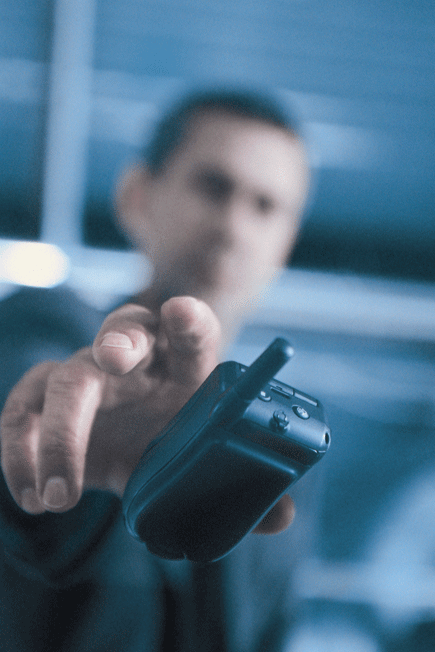
Diet and Health
Putting Risk in a Cell

Warnings about a potential link between cell phones and cancer may be a wrong number but until a definitive study comes along, “there is certainly no cause for panic, but I’m not a fan of presumptive complacency.”
By: Dr. David L. Katz*
We would all like the hazards that threaten our health identified, processed, and put in a cell where they can’t hurt us -- whether they come in the form of dangerously violent people, industrial chemicals or microbial pathogens.
But there is the possibility of a New Age health threat that will be very hard to put into any such cell -- because we’ve put it into cell phones instead.
That, at least, is the opinion of Dr. Ronald B. Herberman, director of the University of Pittsburgh Cancer Institute, who made quite a news splash last week by warning colleagues and University staff of a potential link between cell phone use and cancer. Nor is he the first to do so. An Australian neurosurgeon issued much the same warning only weeks ago.
Those concerned about cell phone dangers invoke the potential harms of radiofrequency waves, or electromagnetic radiation, emitted by the phones. These waves certainly can penetrate our bodies, but there is no clear evidence they harm us in the process. We are left with a mechanism by which cell phones could conceivably do harm, but no real indication that they do.
The published data, based on many studies and observations in hundreds of thousands of people, show no link between cell phone use and disease of any kind, most notably cancers of the brain. One study in the Netherlands examined the issue in more than 400,000 people, with the standard, negative result.
But the experts sounding the alarm cite early and unpublished data, veiling their concerns in something of a fog. The rest of us are waiting to see the data that are raising their hackles. They are right to point out that the studies published to date may not be entirely adequate.
For one thing, cell phones have only existed since the 1970s, been in use since the 1980s, and been truly popular since the ‘90s. So we only have a decade, or at most two, to analyze. Some cancers take two decades or more to develop, so it’s possible, if unlikely, that we are waiting for a slow accumulation of damage to start revealing itself.
And, of course, we don’t have intervention studies, with large groups randomly assigned to use cell phones, or place their calls on placebos instead. I’m not sure how placebo phones would work, but have a sneaking suspicion the study subjects would catch on.
History suggests the possibility of seeing risk that isn’t really there. The silicone breast implant controversy persists, despite consistent and rather compelling evidence that the implants do not cause health problems, including autoimmune disease.
 But a great many women have had the implants, and a great many women have autoimmune disorders. The two overlap. If you were the person who had foreign material implanted in your body, then developed a debilitating, inflammatory condition -- it would be very difficult not to associate the two. Emotion, at times, trumps science. Perhaps that’s the case for cell phone alarmists.
But a great deal of historical precedent cuts the other way. We have cozied up to an impressive array of genuine hazards with a misguided sense of security, including the radioactive radium that made watch faces glow in the dark but caused cancer; mercury used in hat-making that caused neurological disease; lead used in cookware that damaged nerve cells; asbestos in buildings and clothes that is still causing asbestosis and mesothelioma; thalidomide, a sedative that caused birth defects; and the list goes on.
If cell phones cause any harm, the risk appears to be very small, and the harm long delayed. But even one extra case of cancer in 100,000 people after 10 years of use would eventually turn into a huge and unacceptable public health toll. Such a hazard would be very hard to see at this point.
Let’s turn to the practical. I will keep using my cell phone, and my kids will keep using theirs. I think any risks are small. But I cannot be sure the risk is nil, and I will encourage my children to use their phones for good reason, rather than make them a permanent extension of their heads.
There is certainly no cause for panic, but I’m not a fan of presumptive complacency. As for the philosophical, the 19th century philosopher George Santayana wisely noted that those who do not learn from the follies of history are doomed to repeat them. The folly of rushing into hazards of our own devising with a false sense of security has filled many pages of our history books.
Whether cell phone use will prove to be another example is far from certain. But when precedent calls, it is at least prudent to pick up some kind of phone, and listen.
But a great many women have had the implants, and a great many women have autoimmune disorders. The two overlap. If you were the person who had foreign material implanted in your body, then developed a debilitating, inflammatory condition -- it would be very difficult not to associate the two. Emotion, at times, trumps science. Perhaps that’s the case for cell phone alarmists.
But a great deal of historical precedent cuts the other way. We have cozied up to an impressive array of genuine hazards with a misguided sense of security, including the radioactive radium that made watch faces glow in the dark but caused cancer; mercury used in hat-making that caused neurological disease; lead used in cookware that damaged nerve cells; asbestos in buildings and clothes that is still causing asbestosis and mesothelioma; thalidomide, a sedative that caused birth defects; and the list goes on.
If cell phones cause any harm, the risk appears to be very small, and the harm long delayed. But even one extra case of cancer in 100,000 people after 10 years of use would eventually turn into a huge and unacceptable public health toll. Such a hazard would be very hard to see at this point.
Let’s turn to the practical. I will keep using my cell phone, and my kids will keep using theirs. I think any risks are small. But I cannot be sure the risk is nil, and I will encourage my children to use their phones for good reason, rather than make them a permanent extension of their heads.
There is certainly no cause for panic, but I’m not a fan of presumptive complacency. As for the philosophical, the 19th century philosopher George Santayana wisely noted that those who do not learn from the follies of history are doomed to repeat them. The folly of rushing into hazards of our own devising with a false sense of security has filled many pages of our history books.
Whether cell phone use will prove to be another example is far from certain. But when precedent calls, it is at least prudent to pick up some kind of phone, and listen.
* David L. Katz, MD, MPH, FACPM, FACP; Director, Prevention Research Center, Yale University School of Medicine and medical contributor for ABC News. He may be reached at www.davidkatzmd.com.)